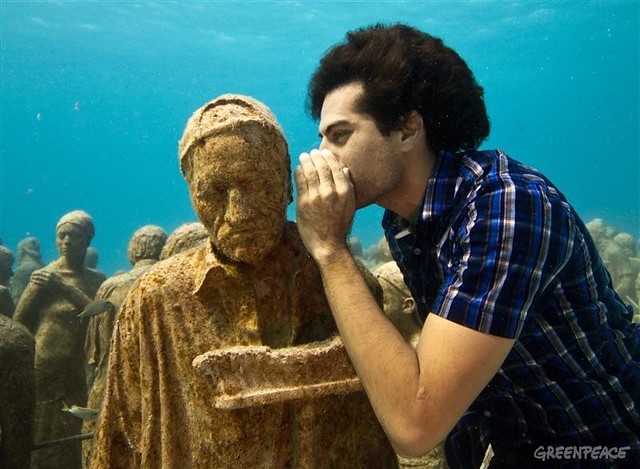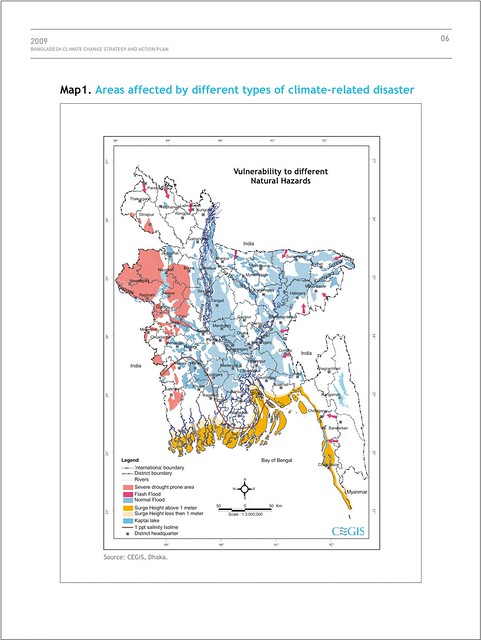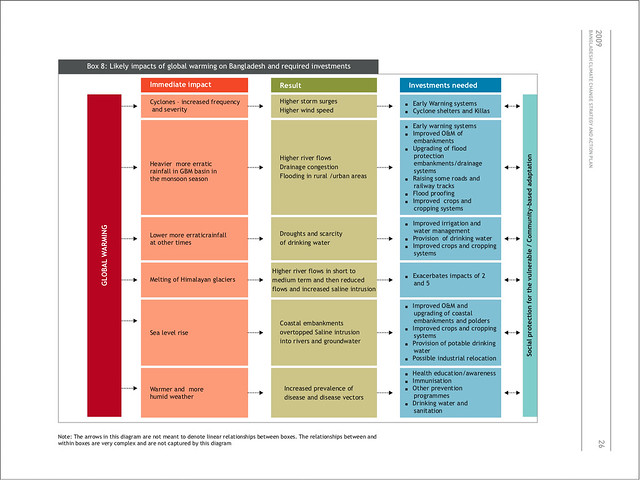bangladesh & COP16: "real people don't live underwater"
by boatsie, from Cancún, Mexico, December 9, 2010
फ़ेअर् फ़के विथौत् फ़ेअर्
"Fear the threat until it comes. When it comes turn and face it without fear." Sanskrit.
In no uncertain terms, officials and scientists representing Bangladesh at the Cancun talks made it clear yesterday that their country, which unabashedly occupies Ground Zero in the climate wars, is fearless and righteously proud in its determination to save itself by ensuring it receives an equitable share of a proposed green climate fund to assist developing countries in adapting to climate change.
"Loans are not an option for my country," said Bangladesh State Minister of Environment and Forests Dr. Hasan Mahmud, MP. "We did nothing to create this problem and we should not be charged in solving it."
Unless something is done now, chances are in less than 40 years you will look at the map and Bangladesh will no longer be there. What will remain of this country will not be recognizable.

How long could you survive without access to clean air underwater? Greenpeace shuttled members out to sea to participate in an extraordinary chilling yet beautiful symbolic action.
Reality: Climate Change will Change the Face of the World
Bangladesh. The first country to submit its National Adaptation Plan (NAPA) in 2005. Designer of the exemplary 2008 Bangladesh Climate Change Strategy and Action Plan (BCCSAP). Successful funding and the completion of numerous major adaption projects set a high standard for other developing countries to evaluate their plans for resilience, capacity building and disaster management. On the front line of mass climate related migrations
Unless action is taken quickly, by the end of the century, more than a quarter of the country will be inundated by water, resulting in the permanent displacement of some 15 million Bangladesh people. That is the equivalent of the combined current populations of New York, Los Angeles and Chicago.
Raising the penultimate question that nobody wants to talk about, nobody even wants to think about: Exactly what is the estimated cost for Bangladesh to adequately adapt to climate change? How about $10 billion over a five year period!
So where oh where is that money going to come from?
So, come on in. Take a look. Digest. Discuss. I double dare you. A word of warning: This journey is not for the faint of heart.
Accompanying us are some prescient words from the masterpiece of English poet T. S. Eliot: The Four Quartets.
Let's dive in. But remember. Real people cannot live under water.
I. FACTS: Reality on the Ground
Dry the pool, dry concrete, brown edged,
And the pool was filled with water out of sunlight,
And the lotos rose, quietly, quietly,
The surface glittered out of heart of light,
And they were behind us, reflected in the pool.
Then a cloud passed, and the pool was empty.
Go, said the bird, for the leaves were full of children,
Hidden excitedly, containing laughter.
Go, go, go, said the bird: human kind
Cannot bear very much reality.
Burnt Norton, I
And the pool was filled with water out of sunlight,
And the lotos rose, quietly, quietly,
The surface glittered out of heart of light,
And they were behind us, reflected in the pool.
Then a cloud passed, and the pool was empty.
Go, said the bird, for the leaves were full of children,
Hidden excitedly, containing laughter.
Go, go, go, said the bird: human kind
Cannot bear very much reality.
Burnt Norton, I
Military experts in the United States and Europe support the estimate that by mid century, climate change will make vast parts of Africa and Asia uninhabitable. Analysts say it could trigger a migration the size of which the world has never before seen.250 million people — a population almost that of the entire United States — could be on the move by 2050. They will go because temperatures are rising and desertification has set in where rainfall is needed most. They will go because more potent monsoons are making flood-prone areas worse. They will go because of other water events caused by melting glaciers, rising seas and the slow and deadly seepage of saline water into their wells and fields.The worst migration cases will be nations like the Maldives and small islands in the Pacific. Their inhabitants will go because their homelands will likely sink beneath the rising sea.According to the Intergovernmental Panel on Climate Change, a minimum of 207 million people in Latin America, Asia and Africa will not have enough water inside a decade. In Asia, an extra 130 million people will be at risk of hunger by the middle of the century. By 2100, crop revenues in Africa will drop 90%. And scientists see Bangladesh as ground zero. Bangladesh: At the mercy of climate change

Reproductions of the some of the most recognizable monuments from around the world were planted in sea. The result is a striking image of some of our most beloved statues, temples and iconic buildings half submerged in water. A symbolic action to remind governments that the rising tide of climate impacts, be they economic, environmental or humanitarian will affect each and every one of us – rich and poor if leaders don't make the choice in Cancun to take immediate action to combat climate change. Here is the latest update on the current state of play at COP 16 link
Facts: Bangladesh• Located 5 meters above sea level
• Flat deltaic flod plain with high population density (over 1,000 per sq. km)
• Coastal zone vulnerability exists along the entire coastal belt
• Mainly rural
• Cropping pattern is directly influenced by climatic trends and weather patern.
• 50% of the population are employed in the agricultural sector

II. Climate Change: Impacts and Actions
What is the late November doing
With the disturbance of the spring
And creatures of the summer heat,
And snowdrops writhing under feet
And hollyhocks that aim too high
Red into grey and tumble down
Late roses filled with early snow?
Thunder rolled by the rolling stars
Simulates triumphal cars
Deployed in constellated wars
Scorpion fights against the Sun
Until the Sun and Moon go down
Comets weep and Leonids fly
Hunt the heavens and the plains
Whirled in a vortex that shall bring
The world to that destructive fire
Which burns before the ice-cap reigns.
East Coker, II
With the disturbance of the spring
And creatures of the summer heat,
And snowdrops writhing under feet
And hollyhocks that aim too high
Red into grey and tumble down
Late roses filled with early snow?
Thunder rolled by the rolling stars
Simulates triumphal cars
Deployed in constellated wars
Scorpion fights against the Sun
Until the Sun and Moon go down
Comets weep and Leonids fly
Hunt the heavens and the plains
Whirled in a vortex that shall bring
The world to that destructive fire
Which burns before the ice-cap reigns.
East Coker, II
FACTS: Bangladesh and Adaptations
Short and medium term adaption project are high priorities in Bangladesh, a prime example of a severely climate vulnerable country which is ideally suited for projects which link climate adaptation to sustainable development. In fact, since the Bali Accord, Bangladesh has been building resilience to global warming and climate change concerns into its development planning.
FACTS: Bangladesh's Vulnerabilities• Substantial increases in urban floods
• A seawater increase of 1 meter will inundate 19% of the country’s land, displacing 30 million people
• every year at least 25% of land is flooded because of increased glacier melting and intense and erratic rainfall
• Desertification is increasing in the north due to salinization
• Rice and wheat production could reduce from current loss of 8% to 32% by 2050
• Significant increases in human health problems, including malnutrition, food insecurity, and the spread of infectious diseases
The LDCs are in agreement that adaptation needs are urgent and immediate. The $100 billion in fast track funding should reflect at least a 50/50 split between mitigation and adaptation. Adaption needs to be evaluated in the long term process as well.
The Bangladesh government emphasizes:
• water management and a basin-wise drainage and development programme
• careful forest resource management; protection of flora and fauna species
• control of polluting chemicals in agricultural development
• restraint on air pollution by transport and power sectors
• adoption of environmental protection in urbanization plan
• regional and global cooperation for protection of the environment and mitigation of climate changes.
• careful forest resource management; protection of flora and fauna species
• control of polluting chemicals in agricultural development
• restraint on air pollution by transport and power sectors
• adoption of environmental protection in urbanization plan
• regional and global cooperation for protection of the environment and mitigation of climate changes.
Additionally, an official government committee is considering an amendment to include the environment more relevantly in the Constitution and has already created a climate change trust fund.
FACTS: Bangladesh adaption projects to date• 400 km of flood protection embankments
• irrigation facilities cover about 2/3 of country
• early warning systems for floods and cyclones
• A separate minister on disaster management and food
• A comprehensive plan for disaster risk reduction
• 3200 cyclone shelters
• 42,000 cyclone preparedness volunteers
• massive plan for dredging
• Investment of close to $200 million in adaptation projects
"...Climate resilience will require very deep cuts in greenhouse gas emissions by the "Annex-1 parties," polluting chemicals in agricultural development, restraint on air pollution by transport and power sectors, adoption of environmental protection in urbanization plan and above all in regional and global cooperation for protection of the environment and mitigation of climate changes." BCCSAP, 2009.
III. Bangladesh and COP16
I think that the river
Is a strong brown god - sullen, untamed and intractable,
Patient to some degree, at first recognised as a frontier;
Useful, untrustworthy, as a conveyor of commerce;
The only a problem confronting the builder of bridges.
The problem once solved, the brown god is almost forgotten
By the dwellers in cities - ever, however, implacable.
Keeping his seasons, and rages, destroyer, reminder
Of what men choose to forget. Unhonoured, unpropitiated
By worshippers of the machine, but waiting, watching and waiting.
Dry Salvages, I
Is a strong brown god - sullen, untamed and intractable,
Patient to some degree, at first recognised as a frontier;
Useful, untrustworthy, as a conveyor of commerce;
The only a problem confronting the builder of bridges.
The problem once solved, the brown god is almost forgotten
By the dwellers in cities - ever, however, implacable.
Keeping his seasons, and rages, destroyer, reminder
Of what men choose to forget. Unhonoured, unpropitiated
By worshippers of the machine, but waiting, watching and waiting.
Dry Salvages, I
FACTS: Climate Action Needs• Global community pledge to reach GHG below 2 degree target to 1.5
• A legally binding climate change deal
• Immediate action on fast start finance
• Preferential treatment for fast track funding
• Support towards capacity building, water security, health security, and renewable energy

Justin Huggler reports from the Sundarbans nature reserveThe Sundarbans nature reserve in Bangladesh's south-west is one of the last untouched places on Earth - and home to the largest population of tigers left in the wild. But the trees in the Sundarbans have suddenly started dying. And not just that: they have started dying in a way nobody has seen before, from the top down.Nobody is sure what the cause is, but the country's leading scientists think the trees are dying because, in recent years, the water has turned from fresh to salty. The Sundarbans is a massive mangrove swamp, and the sea has begun encroaching. What we are seeing may be one of the first casualties of rising sea levels caused by global warming. "Nobody can say for sure whether it is climate change because there haven't been proper in-depth studies," says Professor Ainun Nishat, one of the country's leading environmentalists, and one of those involved in the UN's recent climate change report. "But this is the sort of effect rising sea levels will have on Bangladesh. We are fighting climate change on the front line. But the battle has to be integrated across all countries."
IV. The Green Climate Fund, Sustainable Finance and the Future
There are flood and drought
Over the eyes and in the mouth,
Dead water and dead sand
Contending for the upper hand.
The parched eviscerate soil
Gapes at the vanity of toil,
Laughs without mirth.
This is the death of earth.
Little Gidding, II
Over the eyes and in the mouth,
Dead water and dead sand
Contending for the upper hand.
The parched eviscerate soil
Gapes at the vanity of toil,
Laughs without mirth.
This is the death of earth.
Little Gidding, II
Bangladesh is not interested in loans or market based solutions to adaptation or mitigation. But hopes expired Wednesday as negotiators pushed back the concept of a climate fund for another year, a major disappointment as the fund was one of the only promises made last year in Copenhagen, and was viewed as a sustainable source of financial support to developing countries as they adapt to climate change and reduce their own carbon pollution.
Equally as troubling are the discussions on how to increase the weak emissions reductions pledges originally made last year by industrialized countries. Scientists have repeatedly warned that the pledges are completely inadequate to keep global temperature rise below 2 degrees C or less. The difference between how much we need to reduce emissions by and the pledges currently on the table is known as the "gigatonne gap." You may have heard of it before. Sounds like an inconceivable number? Well that's just how far away we are from where we need to be but those countries with the weakest targets of all, USA, Canada and Russia, are not even willing to acknowledge this gap.You might think that the EU is much better when it comes to addressing the gigatonne gap. They are happy to acknowledge its existence but when it comes to acting on it, the EU refuses to even shift its target up to 30% by 2020 (at 1990 levels) to address the problem. Australia is in a similar position, also acknowledging the gap but refusing to increase its target. So we have countries that refuse to acknowledge the problem and others that admit we have a big problem but none of them are willing to take action to make sure we close the gap! read more of Jess Miller atGreenpeace
"We cannot leave climate solutions to the financial sector," said Dr Mahmud, "not when the financial crisis was created by the private sector.
Campaigners are furious that the World Bank is being promoted as the hub for climate finance. They insist that because the institution continues to bankroll dirty fossil fuel projects, to the tune of $6.6 billion last year alone, the funds to fight climate change are in the wrong hands. They also cite the Bank’s recent history of imposing climate finance as loans, creating new debt for already impoverished countries, increasing the role of the private sector and imposing economic policy conditions that increase inequality."Bing Gong, who imbedded during the conferernce with IFGs Victor Menotti.
"If you are looking for innovation in finance, I personally have an extremely innovative idea for finance. Lets start by looking at the $1.5 trillion military expenditures of the world's leading military countries. Last year, military costs rose by 7%. That represents $70 billion. A fine start for adaptation!"
Saber Hossain Chowdhury, Member of the Bangladesh Parliament, said talks with scientists Tuesday confirmed that even with the rapid implementation of current best practices, we are currently facing an increase in global temperatures of close to 4 degrees. That number, without drastic and immediate action, could rise to 6 degrees.
"I shudder to think of the consequences," he said.
And with that, the meeting was adjourned.
Like I said, this wasn't easy. Thanks for hanging in there.







No comments:
Post a Comment